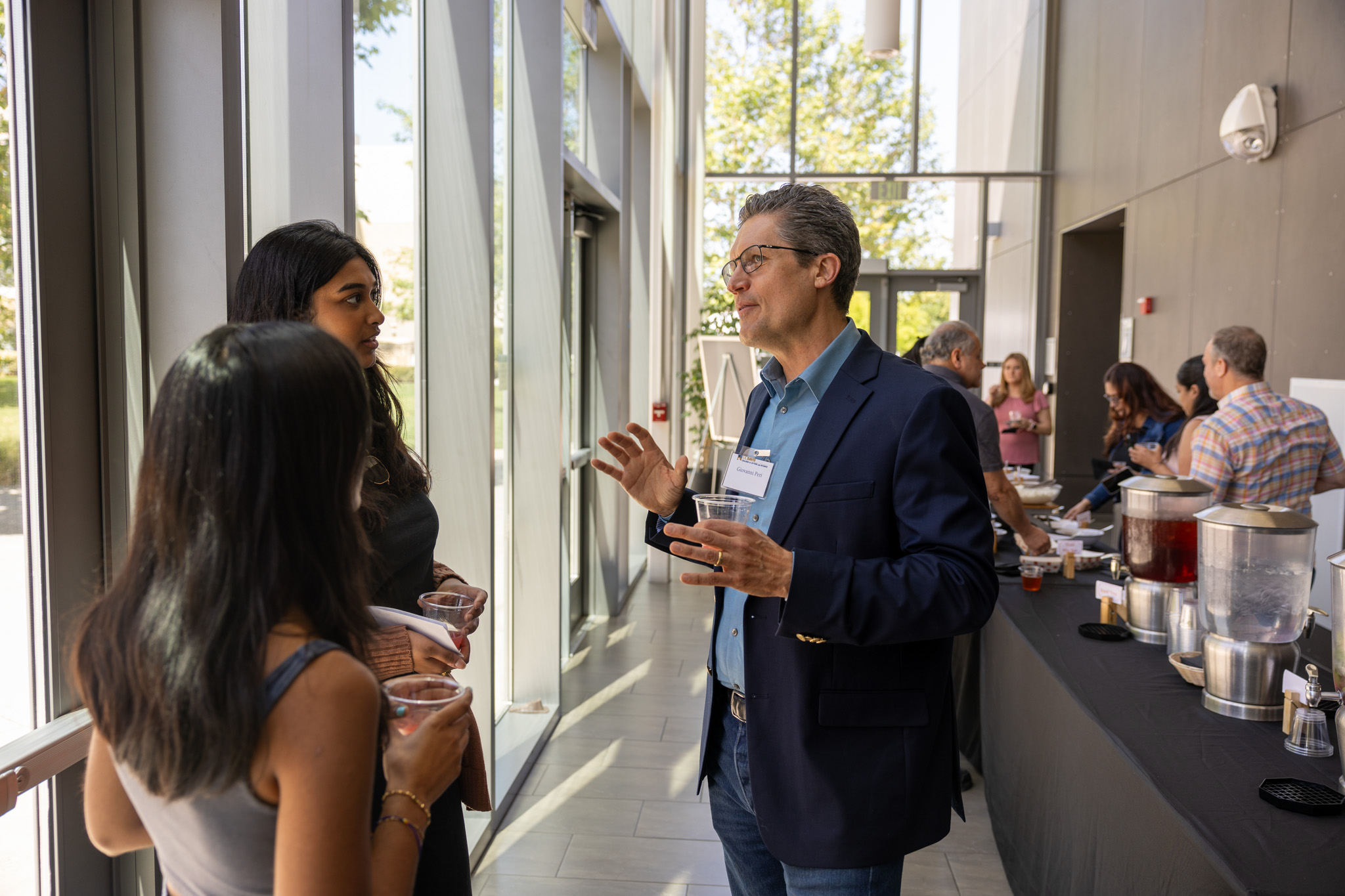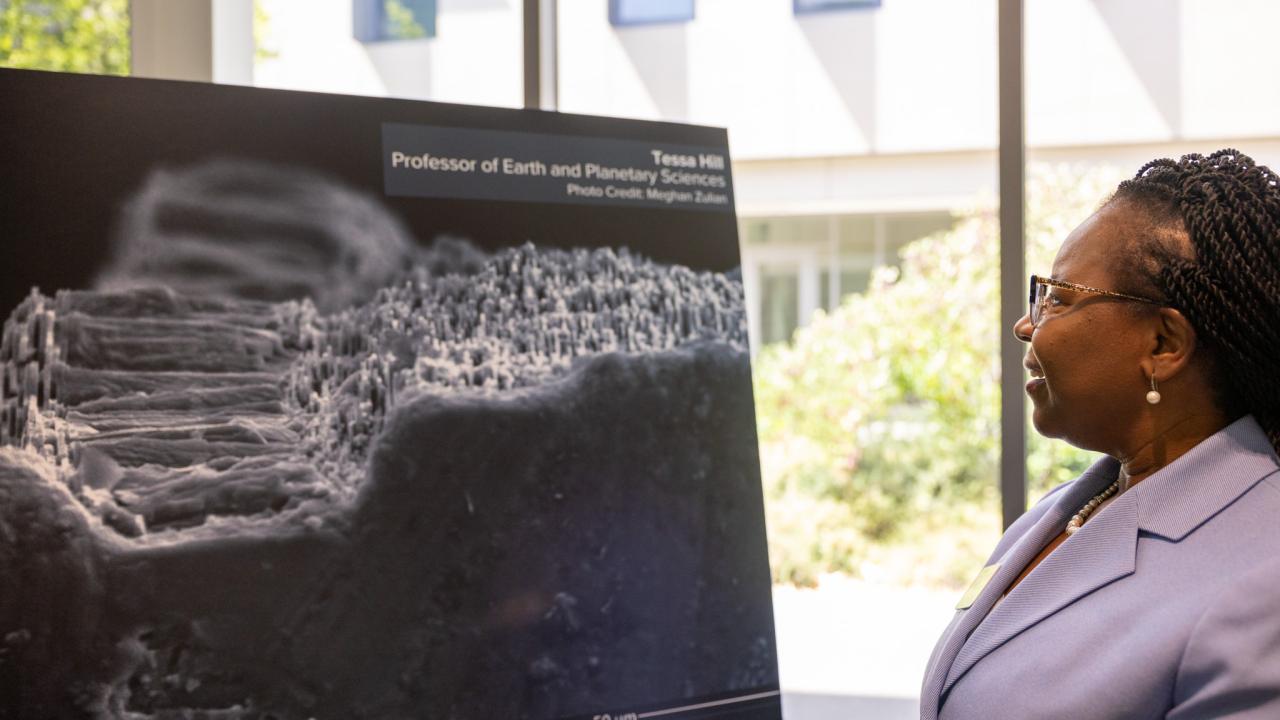
The College of Letters and Science at UC Davis celebrated all things research at its first Research and Creative Activities Celebration, which was held this past week at the UC Davis Conference Center. The event showcased the breadth of academic activities occurring across the College of Letters and Science and its affiliated centers, with faculty presentations and panel discussions.
“Our college’s research activities play a crucial role in elevating the campus research profile,” said Estella Atekwana, dean of the College of Letters and Science, in her opening remarks. “We are leaders in humanities research, helping to unravel the complexities of human existence. Our work informs policymakers, enabling them to make better decisions for the public good. In addition, our strengths in mathematical and physical sciences research deepen our empirical understanding of the world and form the foundation from which many other fields flourish.”
This diversity of research positions the College of Letters and Science as a unique leader, with our faculty’s research capable of addressing society’s grand challenges, from climate change and mental health to immigration and artificial intelligence.
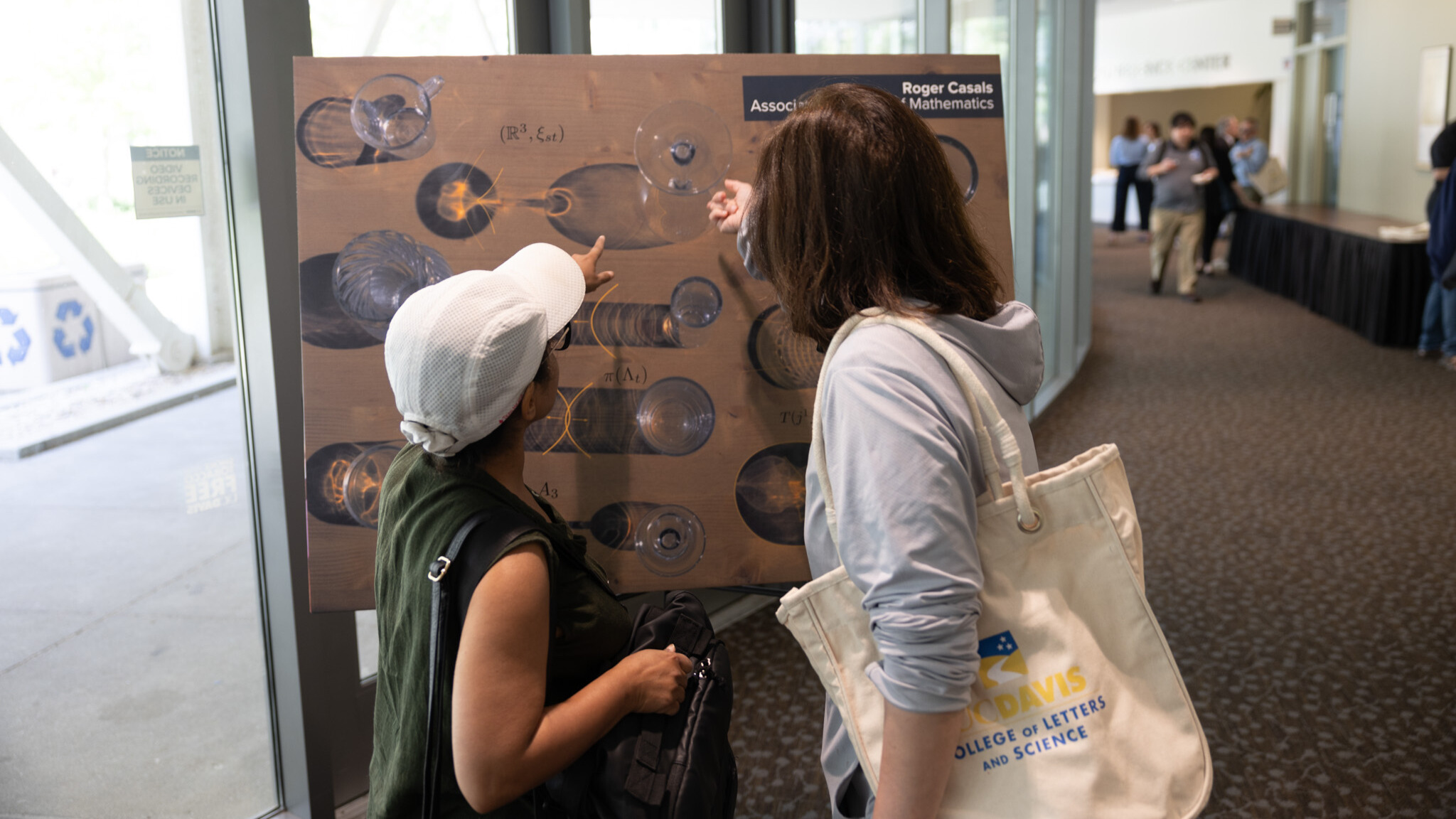
A Lightning Round of Talks
After remarks from UC Davis Vice Chancellor for Research Simon Atkinson and Associate Dean for Research and Graduate Studies Lori Lubin, the latter of whom spearheaded the design of the research celebration, attendees heard from a handful of faculty members who recently received research grants from the College of Letters and Science.
Lee-Ping Wang, an associate professor of chemistry, discussed how his research team is using next-generation supercomputers to address issues like water desalination and second-language acquisition.
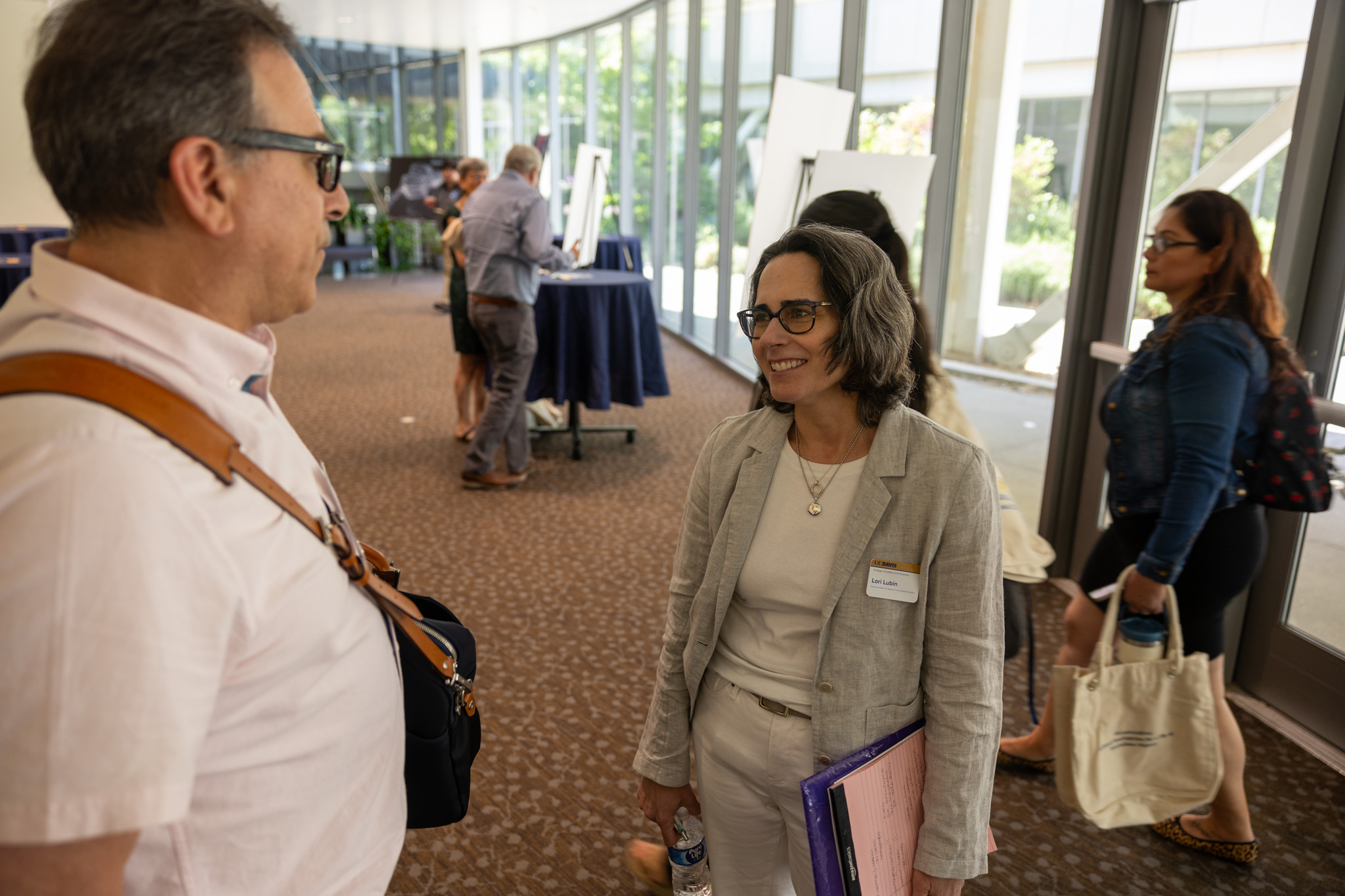
Anna Uhlig, an associate professor of classics, dove into her efforts to apply a decolonizing interpretive approach to ancient Greek poetic texts that were rediscovered on papyrus during the 20th century, or as Uhlig termed it “The Century of Papyrology.” Her research attempts to uncover the lost context of papyrus objects, illuminating how such ancient documents were oftentimes obtained in ethically questionable ways.
“There’s so much interesting research going on at the university and we’re all often in our own little silos, so this is a really great way of showcasing the diversity of excellent work that’s going on,” said David Corina, a professor of linguistics and psychology. “All the talks are great.”
Corina presented his research on the impact of cochlear implants on the developing brains of children. While cochlear implants have been a helpful technology for children with hearing loss, outcomes, including strides in spoken language, aren’t uniform. Corina’s research aims to better understand the effect of auditory deprivation on the brain and if haptic, or tactile, stimulation can help fill in missing information.
Additional lightning round presenters included Tiffany Jo Werth, associate professor of English, and Marian Schlotterbeck, associate professor of history. Both discussed their forthcoming books: “The Lithic Imagination from More to Milton” (Werth) and “Making Neoliberal Citizens: Childhood in Pinochet’s Chile” (Schlotterbeck).
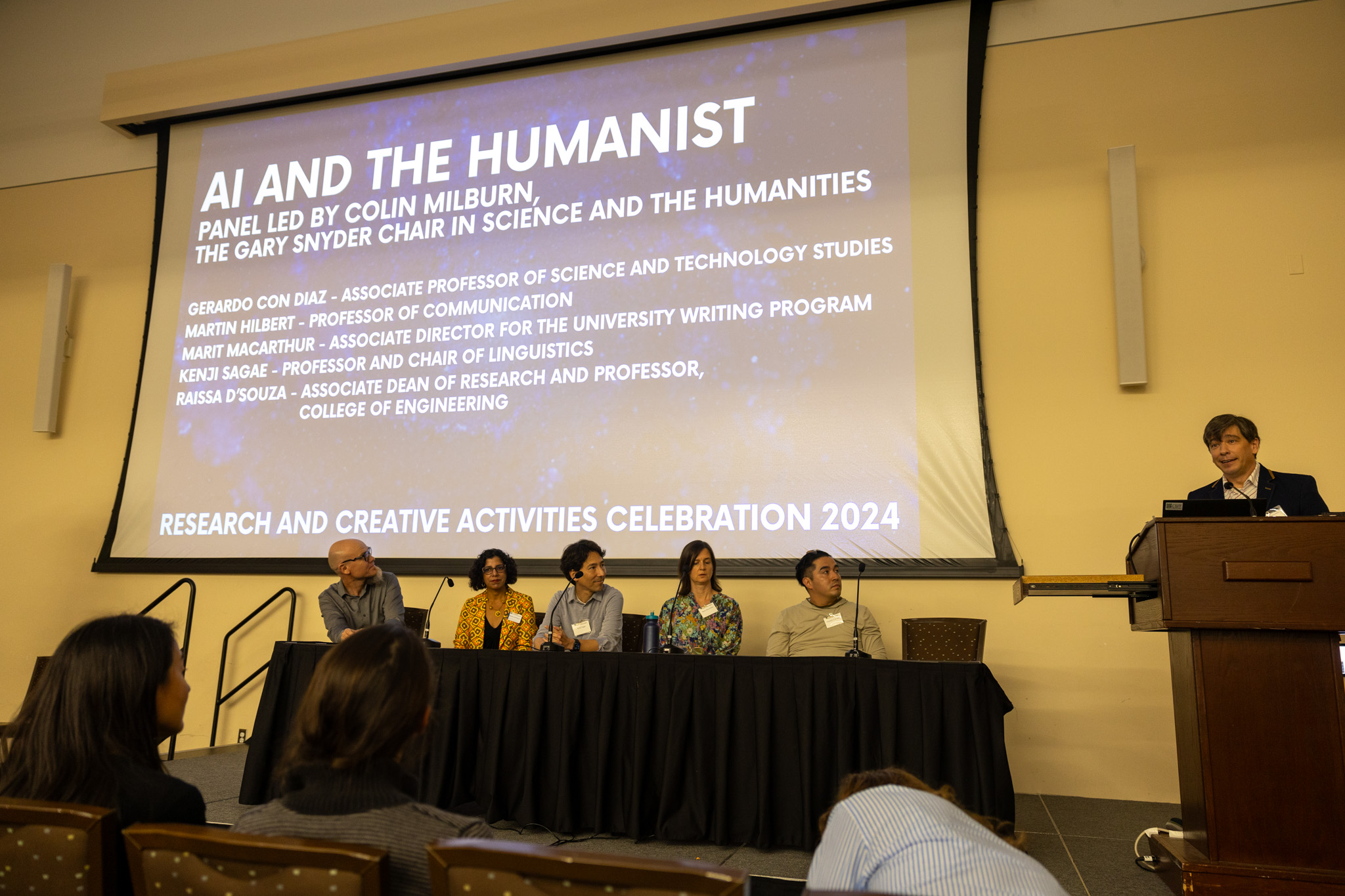
Center Presentations and a Discussion About AI
The Research and Creative Activities Celebration also provided an opportunity for the College of Letters and Science to highlight its affiliated centers, including the Institute for Psychedelics and Neurotherapeutics (IPN) and the Global Migration Center.
About 1 billion people worldwide are affected by mental illness, according to the World Health Organization. For the last 30 years, such illnesses have been addressed by attempts to correct chemical imbalances in the brain. But, according to David Olson, director of IPN and professor of chemistry, many of these illnesses don’t stem from chemical imbalances. Rather, they’re due to problems in neural circuitry.
At IPN, Olson and his colleagues are revolutionizing medicine by taking inspiration from psychedelics, like LSD, psilocin and MDMA. Inspired by the molecular structure of these chemical compounds, they’re designing drugs called psychoplastogens, which harness the therapeutic value of psychedelics while discarding potentially adverse effects. Through chemical evolution and by tweaking pharmacology, these optimized therapeutics promote neuronal healing, providing a more viable alternative to current medicines.
“This is an excellent opportunity to learn about the incredible variety and importance of research that is done in the college and to appreciate our colleagues,” said Giovanni Peri, director of the Global Migration Center and professor of economics. “For me, I feel like I’m almost just starting to discover all the research that is at L&S.”
Peri gave a sprawling presentation about the important work being done at the UC Davis Global Migration Center. For example, in their research, Peri and his colleagues show that immigrants are highly educated and economically productive members of society, and that they don’t hurt native wages or contribute to increased crime rates.
The Research and Creative Activities Celebration wrapped with a panel discussion titled “AI and the Humanist.” The panel was led by Colin Milburn, the Gary Snyder Chair in Science and the Humanities, and a professor of both English and Science and Technology Studies. The panel covered a myriad of issues involving AI, from the legal ramifications of AI-generated imagery to the importance of the humanities and academia in creating morally and ethically sound AI systems.
The Research and Creative Activities Celebration served as a reminder of all the impactful research occurring at the College of Letters and Science.
“Seeing colleagues from so many departments come together to celebrate each other’s work and accomplishments is truly inspiring,” Atekwana said. “This is the kind of community that makes our college — and our campus — a very special place.”
